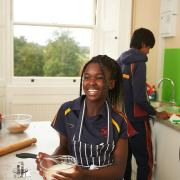How to find the educational support your child needs.
John Floyd, headmaster at Bruern Abbey School in Chesterton, explains how they can help your son overcome the difficulties dyslexia can present.
Q: How does dyslexia affect learning?
A: Dyslexia typically affects a child’s ability to read, write, or spell. It can be hard for them to answer questions in writing and take on large chunks of new information.

Dyslexia isn’t a reflection of your child’s intelligence, but a gap between their innate ability and their output on the page. They may not learn in the same way as other children but, with the right support, they can build their confidence and develop their skills.
Q: How can I tell if my child is dyslexic?
A: In school, children with dyslexia will probably have trouble taking notes, copying from the board or spelling common words. Your child may try to avoid doing homework, grow increasingly frustrated with reading, or find other ways to gain attention, like acting up or playing the class comedian.
Q: How can you support dyslexia in the classroom?
A: We’ve tailored our timetable to suit dyslexic learning. Each of our junior classes has fewer than 13 students and two teachers, allowing teachers to focus on each child’s specific needs. All pupils have approximately twice as many English and Maths lessons as a standard prep school.
We run a skills-based curriculum where we focus on ‘how to do things’ and use laptops to aid learning and create an active and stimulating environment. This helps ease students’ stress and makes learning fun.
We dedicate more time to clarifying information and breaking it down into bite-size snippets that are easy for a dyslexic child to understand. Being surrounded by other students with the same struggles reassures children they are not alone and helps build their self-esteem.

Q: How can you help students overcome learning difficulties?
A: We help students develop their reading, writing and numeracy skills to a point where they feel confident in these subjects and capable of learning independently. We teach students until the beginning of Year 9, preparing them for the Common Entrance exams.
This enables students to return to a mainstream schooling system to take their GCSE’s. Dyslexia doesn’t mean your child needs to remain in a specialist school - we’ll arm them with the skills they need to take the next steps towards their chosen future.

Q: How can I help my dyslexic child?
A: Firstly, don’t panic – dyslexia won’t affect your child’s chances of success. Albert Einstein, Richard Branson, Kiera Knightley and Jamie Oliver all suffered from dyslexia and achieved great things.
If you’re home-schooling during lockdown, try discussing ideas instead of getting your child to write them down all the time. Make lessons active where you can and remain patient. Talk with your children’s teachers to see what support is available.
When returning to the classroom, consider what learning environment your child needs – a more intimate and focused setting could help.
You can book a video call with me to discuss your child’s needs, take a virtual tour of the site and gather the information you need to find the best school for your child.
Q: What are the benefits of attending a specialist school?
A: We are the only prep school in the country whose primary purpose it is to prepare boys, aged eight to 13, with learning difficulties for common entrance exams. We believe that what we offer is truly unique.
We aim to help students overcome the challenges dyslexia presents and teach them the academic, social and emotional skills they need to succeed.
Visit bruernabbey.org to apply.
Contact us on 01869 242 448 or email admissions@bruernabbey.org to book a video consultation or virtual tour of the school.




























